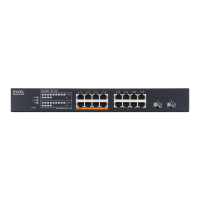
Do you have a question about the ZyXEL Communications XMG1915 Series and is the answer not in the manual?
| MAC Address Table Size | 8K |
|---|---|
| Jumbo Frame Support | Up to 9KB |
| Power Supply | Internal |
| Input Voltage | 100-240 VAC, 50/60 Hz |
| Port Type | Gigabit Ethernet |
| Layer | Layer 2 |
| Ports | Gigabit Ethernet |
| Management | Web GUI, CLI |
| VLAN Support | Yes |
| Quality of Service (QoS) | Yes |
| IGMP Snooping | Yes |
| Link Aggregation | Yes |
| Operating Temperature | 0°C to 40°C |
| Storage Temperature | -40°C to 70°C |
| Humidity | 5% to 95% (non-condensing) |
Provides an overview of the Switch's main features and applications.
Explains standalone and Nebula cloud management modes for the Switch.
Details the process of switching between standalone and Nebula cloud management modes.
Introduces the ZON Utility for simplified network device setup and maintenance.
Describes the Switch's Power Sourcing Equipment (PSE) capabilities and PoE standards.
Illustrates various network scenarios where the Switch can be utilized effectively.
Outlines the different methods available for managing the Switch.
Provides recommendations for secure and effective Switch management practices.
Details the different ways the Switch can be installed.
Lists essential safety measures to follow before operating the Switch.
Step-by-step guide for placing the Switch on a desktop.
Instructions for mounting the Switch on a wall, including requirements.
Guidelines for installing the Switch in a standard EIA rack.
Details the connectors and ports on the Switch's front panel.
Describes the components and connections on the Switch's rear panel.
Introduces the HTML-based management interface for system setup.
Explains how to access the Switch's Web Configurator interface.
Details the ZON Utility for efficient network device deployment and management.
Guides through initial setup steps including IP, password, and SNMP configuration.
Explains the components and navigation of the Web Configurator interface.
Instructions on how to save current settings to non-volatile memory.
Warns about actions that can block management access to the Switch.
Describes how to reset the Switch to its factory default settings.
Procedure for securely logging out of the Web Configurator.
Explains how to use the online help feature within the Web Configurator.
Introduces the steps for initial Switch setup in an example network.
Step-by-step guide on creating a VLAN for network segmentation.
Configures the Port VLAN ID (PVID) to tag untagged frames for VLAN forwarding.
Details how to set the Switch's management IP address for network access.
Introduces examples of using the Web Configurator for setup and use.
Step-by-step guide on enabling and configuring DHCPv4 snooping on the Switch.
Demonstrates how to configure the Switch to forward DHCP client requests.
Describes the restructured user interface of the Web Configurator.
Details the information displayed on the DASHBOARD screen for system status.
Introduces the ARP protocol for IP to MAC address mapping.
Explains how to view IP-to-MAC mappings and remove dynamic ARP entries.
Explains how the Switch forwards or filters packets based on IP addresses.
Describes how to view IP address information and sort data.
Introduces the IPv6 neighbor table used for address resolution.
Explains how to view IPv6 neighbor information and status.
Describes the MAC table as a filtering database for frame forwarding.
Explains how to search and manage MAC addresses and filtering rules.
Describes viewing and managing neighboring devices using LLDP.
Provides detailed information on discovered neighboring devices.
Explains Path MTU Discovery for determining the largest packet size.
Describes how to view IPv6 path MTU information on the Switch.
Outlines viewing port status, DDMI, and port utilization information.
Displays a statistical summary of ports with links to detailed status.
Introduces IPv4 and IPv6 routing tables for packet forwarding information.
Explains how to view and manage the IPv4 routing table.
Explains how to view and manage the IPv6 routing table.
Describes viewing general system and hardware status of the Switch.
Displays general system information and hardware status.
Explains that log messages store system history for viewing.
Describes how to view, refresh, clear, and download system logs.
Introduces Zyxel Nebula Control Center for remote management.
Explains how to enable and view NCC discovery status for cloud management.
Configures general settings like system name, location, and time.
Configures fan control and SFP Detect features for hardware monitoring.
Explains creating virtual interfaces for configurations.
Describes viewing and setting IPv6 interfaces for management.
Covers configuring IP settings and IP interfaces on the Switch.
Displays current IP interfaces and DNS server settings.
Configures default gateway, DNS server, and IP domains.
Configures proxy settings for communication with NCC.
Introduces the IPv6 screens and capabilities.
Displays IPv6 table and DNS server information.
Configures global IPv6 settings for the Switch.
Views and configures IPv6 interfaces for Switch management.
Configures the link-local address and default gateway for IPv6 interfaces.
Configures the interface's IPv6 global address and prefix length.
Configures neighbor discovery settings for each IPv6 interface.
Configures router discovery settings for each IPv6 interface.
Configures the Switch’s IPv6 prefix list for each interface.
Configures static IPv6 neighbor entries in the IPv6 neighbor table.
Configures Switch settings when acting as a DHCPv6 client.
Describes how to configure administrator and non-administrator accounts.
Introduces SNMP settings for network management.
Details the configuration of general SNMP settings.
Explains how to create SNMP users for authentication with SNMP v3.
Specifies types of SNMP traps to send to each SNMP manager.
Configures sending SNMP traps on specific ports.
Provides background information on SNMP topics.
Covers basic Switch setup like VLAN type and MAC learning.
Allows configuration of VLAN type, MAC learning, and ARP aging time.
Explains the syslog protocol for sending event notification messages.
Configures system logging settings and external syslog servers.
Explains setting one-time and recurring schedules for time-oriented features.
Allows defining Absolute and Periodic time ranges for schedules.
Explains how Green Ethernet reduces switch port power consumption.
Details settings for Energy Efficient Ethernet (EEE) and Auto Power Down.
Explains logically aggregating physical links for higher bandwidth.
Displays configured trunk groups and active ports.
Configures static link aggregation and traffic distribution algorithms.
Enables LACP for dynamic link aggregation and port redundancy.
Provides background on link aggregation concepts.
Explains LLDP as a Layer 2 protocol for device advertising and discovery.
Introduces LLDP-MED for enhanced discovery of media endpoint devices.
Displays a summary of LLDP status on the Switch.
Shows LLDP status for connected neighboring devices.
Configures global LLDP settings on the Switch.
Configures basic TLV settings for LLDP on each port.
Configures organization-specific TLV settings for LLDP.
Configures LLDP-MED parameters for media endpoint devices.
Configures LLDP-MED network policy parameters.
Configures LLDP-MED location parameters for endpoint devices.
Displays current power supplied to connected PoE devices and total power budget.
Sets PoE mode, priority, power-up, and maximum power for PDs.
Applies schedules to ports for controlling PoE power availability.
Configures Switch port settings such as speed, duplex, and flow control.
Explains how to configure the Switch to guard against network loops.
Enables loop guard on the Switch and specific ports.
Discusses port mirroring setup for traffic analysis.
Allows selection of a monitor port and traffic direction for copying.
Explains multicast features and concepts like IGMP.
Shows IPv4 multicast group information.
Enables IGMP snooping to forward group multicast traffic efficiently.
Performs IGMP snooping on specified VLANs.
Discusses configuring forwarding rules based on MAC or IPv4 addresses.
Configures static multicast MAC addresses for ports to receive multicast streams.
Explains Quality of Service (QoS) using DiffServ for traffic prioritization.
Activates DiffServ to apply marking rules or 802.1p priority mapping.
Configures DSCP to 802.1p mapping for traffic prioritization.
Introduces supported queuing methods to manage network congestion.
Sets priorities for Switch queues to distribute bandwidth.
Explains IEEE 802.1p for traffic prioritization and physical queue mapping.
Assigns priority levels to physical queues based on traffic types.
Explains capping maximum bandwidth for traffic flows on ports.
Limits bandwidth for traffic going through the Switch.
Explains support for STP, RSTP, and MSTP standards to prevent network loops.
Displays STP status based on the implemented mode (RSTP or MSTP).
Activates one of the STP modes (RSTP or MSTP) on the Switch.
Views the RSTP status after activation.
Configures RSTP settings on the Switch.
Views the MSTP status after activation.
Configures MSTP settings on the Switch.
Configures MSTP port settings.
Provides background on link aggregation concepts.
Discusses port filtering based on MAC addresses and VLAN groups.
Creates rules for traffic filtering based on MAC addresses and VLANs.
Discusses configuring forwarding rules based on MAC addresses.
Assigns static MAC addresses for ports to receive multicast streams.
Explains how to configure 802.1Q tagged and port-based VLANs.
Describes tagged VLANs and frame structure.
Views and searches all static VLAN groups.
Configures static VLANs for the Switch.
Configures static VLAN (IEEE 802.1Q) settings on a port.
Allocates a VLAN specifically for voice traffic with defined priority.
Assigns untagged packets to VLANs based on the source MAC address.
Assigns untagged packets to VLANs based on vendor ID and MAC address.
Defines packet forwarding decisions based on destination MAC and port.
Sets up port-based VLANs with options for all connected or port isolated.
Introduces ARP for mapping IP addresses to MAC addresses.
Configures ARP learning mode on a per-port basis.
Creates static ARP entries that do not age out.
Explains the DHCP feature for obtaining TCP/IP configuration.
Displays the DHCPv4 relay mode and status.
Configures the Switch to forward DHCP requests between clients and servers.
Creates DHCPv4 option 82 profiles for relay agent information.
Configures global DHCPv4 relay settings and port-specific profiles.
Configures DHCP settings based on the VLAN domain of DHCP clients.
Enables and configures DHCPv6 relay settings for specific VLANs.
Shows how to configure static routes for IP communication.
Configures and enables IPv4 static routes.
Configures and enables IPv6 static routes.
Describes configuring AAA settings for user access control.
Configures RADIUS server settings for authentication.
Configures authentication, authorization, and accounting methods.
Provides background on Vendor Specific Attributes (VSAs).
Describes methods to control access to the Switch.
Decides which services can be used to access the Switch.
Specifies trusted computers for administrator access.
Encrypts all passwords configured in the Switch.
Explains SSH and HTTPS protocols for secure communication.
Introduces the storm control feature to limit broadcast, multicast, DLF packets.
Configures limits for broadcast, multicast, and DLF packets per port.
Explains configuring rate limits and actions for detected errors.
Views detected errors and port status related to error-disable features.
Limits control packets to protect CPU efficiency.
Detects control packet rate limits and configures actions.
Configures automatic undo of actions after errors are resolved.
Filters unauthorized DHCP server packets and builds a binding table.
Displays statistics about the DHCP snooping database.
Enables DHCP snooping and configures the database.
Specifies trusted or untrusted ports for DHCP snooping.
Enables DHCP snooping per VLAN and configures Option 82.
Applies DHCP option 82 profiles to specific ports within a VLAN.
Provides background on trusted vs. untrusted ports and database configuration.
Shows how to set up port security.
Explains port security allowing only learned or static MAC addresses.
Enables port security, MAC freeze, and limits learned MAC addresses.
Explains configuring screens for maintaining firmware and configuration files.
Imports CA-signed certificates for secure HTTPS connections.
Provides background on FTP commands and filename conventions.
Explains managing multiple switches through one cluster manager.
Views the Switch's role in the cluster and accesses member configurators.
Configures clustering management settings.
Provides background on cluster member switch management.
Restores a previously saved configuration file to the Switch.
Saves current Switch configurations to a computer.
Resets the Switch to its Zyxel default configuration settings.
Saves current configuration settings permanently.
Copies settings from a source port to destination ports.
Pings IP addresses, runs traceroute, performs port tests, and shows location.
Upgrades the Switch's firmware via Web Configurator or NCC.
Restarts the Switch and loads a specific configuration file.
Logs information for issue analysis and customer support.
Troubleshoots issues related to power, connections, and LED indicators.
Addresses problems with accessing the Login screen or logging into the Switch.
Helps resolve issues with lost configuration settings or loading files.
Addresses problems with Powered Devices (PDs) not receiving power.
Resolves issues with registering the Switch in Nebula or managing it.

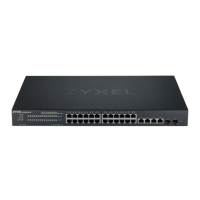

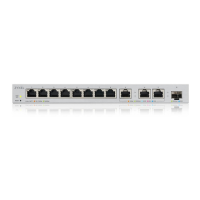
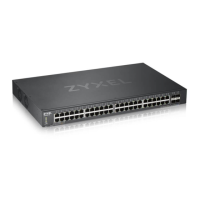
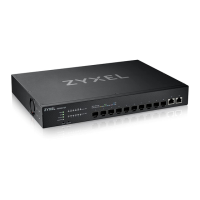
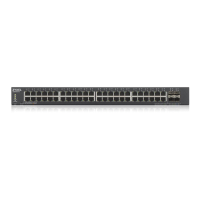


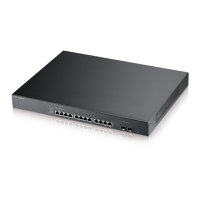
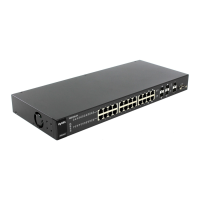
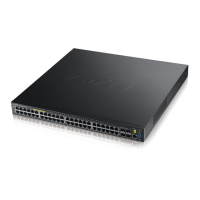
